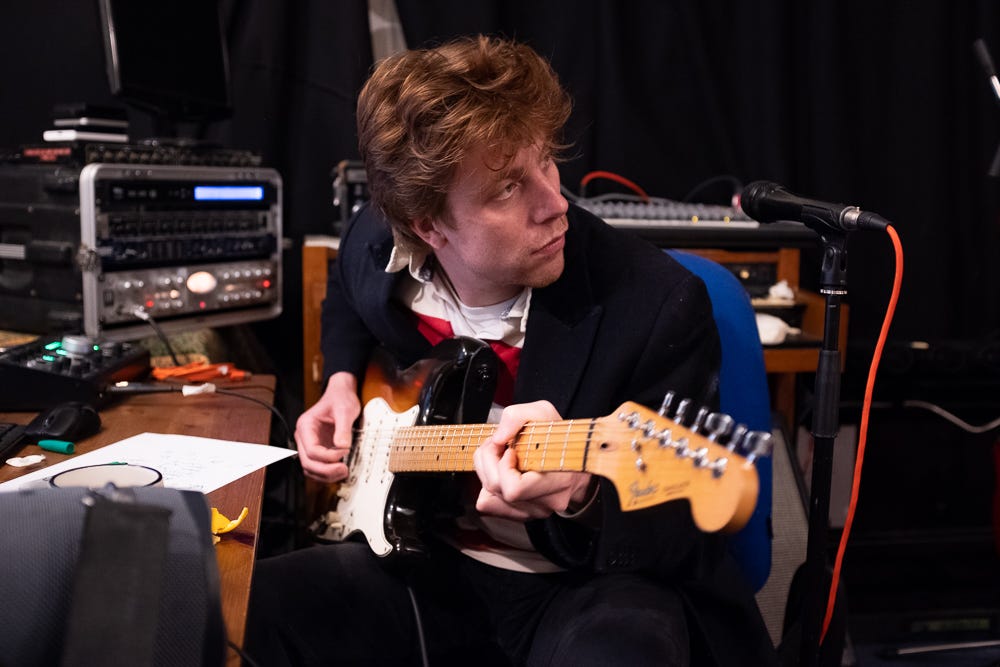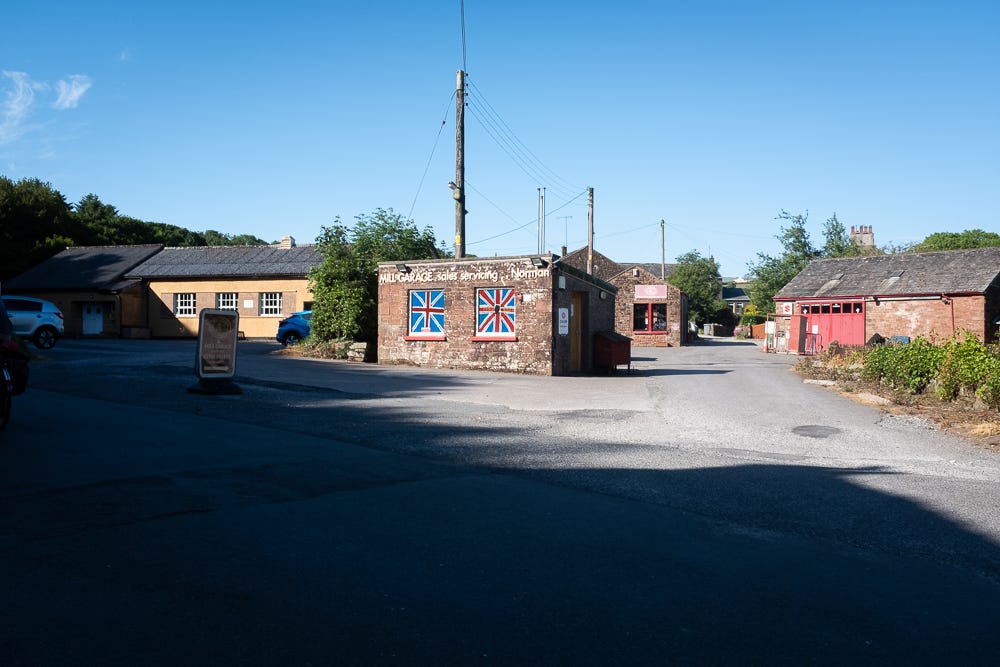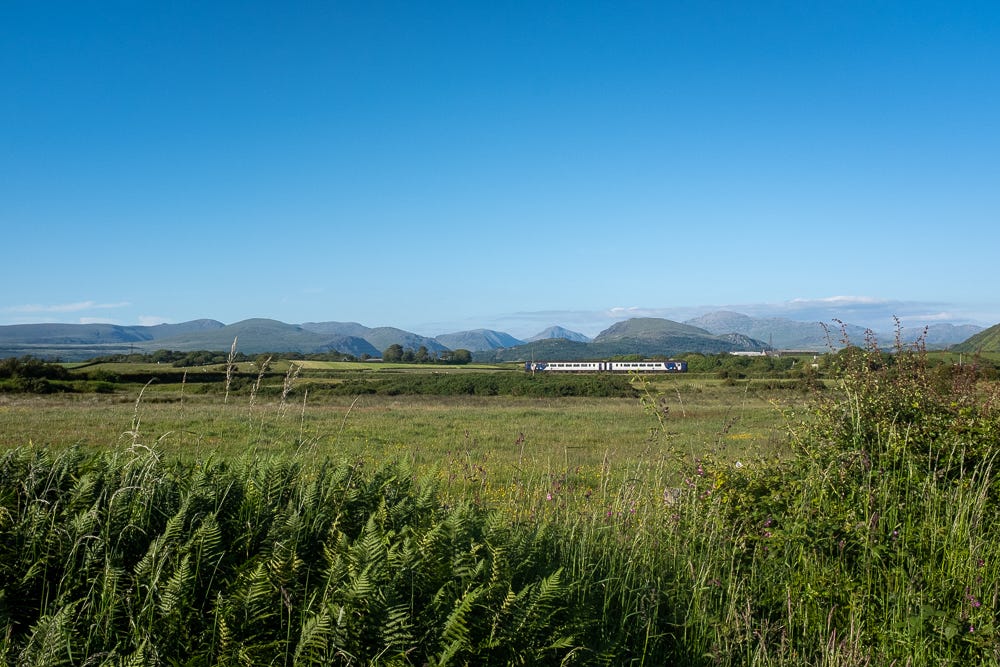Carlisle seemed empty. It was 7 on a Monday evening but the pedestrianised streets were eerily quiet. I’d met two musicians from the band Hardwicke Circus the week before. They were on the bill with Madness and I’d chatted to the lead singer, Jonny Foster, briefly after the gig. I told him I’d be up north, “Come and stay,” he said, “Take a ride.”
I did and arrived at theirs that evening. I was greeted by Jonny and his brother Tom, the drummer. “Thanks for having me!” I said, “I don’t think I’ve ever been to Carlisle.”
“No”, came the response, “Not many people have.”
While that could well be because Carlisle wasn’t in the Doomsday Book, it’s more likely because the reviews on TripAdvisor aren’t great: “This is the worst site I’ve ever visited,” said one referring to the castle. Another urged fellow travellers to “save your money and go somewhere else.”
It probably doesn’t help that the town is cursed. In 1525 the Bishop of Glasgow unleashed a savage malediction on Carlislians’ heads “and all the hairs on their heads.” He went on to make sure every feature of the body was included: their mouths, tongues, feet, even their wombs. He didn’t stop there, including hens, geese and cabbage patches. It’s not surprising that the town has struggled ever since. The council made the peculiar decision in 2000 to actively celebrate the curse with a commemorative stone which instead unleashed a flurry of bad luck: foot and mouth disease, job losses and a goal drought for the local football team.
More recently the town suffered a gruesome and truly tragic event. A local man took his own life by throwing himself off the top of Dixon’s Chimney. Unfortunately, as he leapt his foot caught on a rope and he was left hanging, dangling by his foot until he died. The towering redbrick shaft is the 8th tallest chimney in the world which not only made it very difficult to get him down, it took 26 hours to finally remove the body, but also meant it was visible from all across the city, scarring all those unfortunate enough to see it.
Despite Carlisle’s curse and this horrific story, I liked it a lot. It’s a city rich with a long history going back to before the Romans and you can feel it in the streets, under the red gaze of its castle. For centuries it was England’s last bastion of defence against the Scots and its walls were built to keep rampaging Reivers like the ‘fair maiden Lilliard’ at bay, about whom this 1545 ballad is about:
Little was her stature, but buckle was her fame,
Upon the English loons she laid monie thumps,
An’ when her legs were cuttit off, she fought upon her stumps.
My main experience of Carlisle however was through the lens of the city’s own Hardwicke Circus. We spent a night at the keyboardist’s out in the woods and spent the next day in the studio. We went wild swimming and were caught short by a radio presenter wanting an interview with Jonny, “Sorry,” he told him, “I was just about to jump into a pond. That’s what we do in this part of the world.”
They told me about their prison tour last year and how at each of the 12 gigs they played they asked the audience if anyone would come and sing with the band. There had been some great performers joining them, singing or rapping with the band but one time a quiet man stepped forward looking an unlikely performer. The band feared they’d get a volley of abuse and began to regret their decision. Instead, the inmate opened his mouth and broke into the most extraordinary opera. The audience and the band were utterly spellbound. After the show, they discovered the prisoner had arrived 6 years ago and since the day he first arrived he’d never spoken a single word until that moment.
After two days with the Fosters, I got back on the road, heading west from Carlisle. Rather like the county’s capital, the west coast of Cumbria gets overshadowed by the Lake District which sees nearly 16 million tourists every year and few bother driving the extra hours. From the passenger seat, I discovered it was a wonderful part of the world.
I was initially aiming for Whitehaven but found I had to get several lifts to get there although none of them took long to hail. One thing I noticed about the residents of West Cumbria is that none of them think a great deal of the place. Three ladies drove me to a charming town called Maryport just up the coast from Whitehaven, which they told me with hushed voices they call ‘Scaryport’. I thought it was a very unfair name given that everyone I passed in the town said hello to me. Some even went as far as to ask how I was which is the only town I’ve ever had that.
One chap called Terry thought the greatest thing about the area was his local lawn bowls club and told me with relish how he’d destroyed his opponent the night before. Mark meanwhile, who took me on to Whitehaven, asked simply, “Why are you going there? It’s horrible!”
I explained that I wanted to see it because it used to be the second biggest port in the country.
“Slave port,” he interjected quickly before explaining it has long since fallen on hard times.
He was right, Whitehaven used to be a huge slave port. Between 1750 and 1772 it was the second biggest port in Britain which at that time meant it was a slave port. The majority of goods it traded in were products coming out of the American plantations: tobacco, sugar and cotton predominantly. Famous slave ships like the King George sailed from Whitehaven to West Africa to load themselves with human cargo. The horrific ‘middle passage’ to America followed on which millions died. Those lucky enough to survive were replaced by commodities which were sent back to Whitehaven for the process to begin again.
62% of Copeland (West Cumbria) voted to leave the EU, many of them with nationalist agendas but those who didn’t felt that the exclusionary tendencies of modern Cumbrians was inconsistent with their multicultural history. Lucy, a vicar, described how ever since the Romans, the county had been full of people from all over the world. When Whitehaven was an international port this was intensified even more: Irish, Spanish, Africans, Americans, they all came to Whitehaven.
Mark for example grew up in Zimbabwe. His school was harsh and he was beaten often and its teachers taught white supremacy. His father was a hard man and when Stewart said he wanted to join the army, he promised to punch him if he did. Instead he was sent to England to do his A levels and found himself in Cumbria. There he dropped out and suddenly saw through the doctrines he’d been taught all his life.
“I grew my hair long, smoked grass, did drugs, drove buses, went wild. I became a proper hippy,” he explained. He looked over at me, “A bit like you really!” I wasn’t quite sure I agreed…
As he dropped me in Whitehaven he told me he was going straight to hospital. His daughter was giving birth that day to his first granddaughter. “Any moment now I’ll officially become an old bastard.”
Whitehaven is an extraordinary town. Grand and handsome, it looks a lot like Greenwich with colourfully plastered buildings dressed with heavy stone pediments, pilasters and quoining. Swags adorn the upper reaches and coats of arms stand proud above the doorways. The streets are laid out in a grid, revolutionary for the time. Many of the early American cities are based on Whitehaven’s layout, including New York.
In the 18th century, the city was booming. Trade was huge and Whitehaven had coal, mercilessly mined by the town’s near-monarchical owners, the Lowthers. It was the first place to develop undersea mining, so long shafts spread out like prying fingers under the Irish Sea. The mines were the technological wonder of the world and engineers came from all over to marvel at them.
It was always doomed to decline. Even by the 19th century when Britain reached its zenith, Whitehaven’s best days were behind it. It lacked a deep water port and the rugged Cumbian fells made overland travel there difficult, a problem which it still lives with today. Soon the trade in tobacco, sugar and slaves was mostly found in Liverpool and Glasgow. Today, despite the fine facade, many of the shops are completely empty. Emblematic of the decline, the once bustling customs house has been the regional headquarters of Age UK since 1974. When I went past it looked like even they’d vacated it.
Some thought the building of Sellafield, the enormous nuclear power plant just a few miles away, would see a regeneration for the town and the local area, but it hasn’t really materialised. As I headed south from the town I was taken right past it. It loomed ominously on the shoreline, a huge industrial complex bristling with chimneys and shining metal pipes. Some say if Sellafield exploded the blast would be felt in Paris. Others say when Bin Laden was captured they found plans to bomb it.
“What is true,” the man driving me on his way to work there told me as we cruised towards it, “is that there are two fighter jets that can be scrambled if anything flies anywhere near it, so Bin Laden wouldn’t have got far!” It’s also true that it is a nuclear technological wonder, the largest in Europe and with the broadest range of nuclear capabilities in the world. Like the Lowthers’ undersea mines before it, it’s visited by engineers from across the globe.
Dave asked me why on earth I was visiting the area, a question I was now used to. I told him I just fancied it. “If I were you I’d turn around and go the other way.” Like the others before him, Dave didn’t think much of Copeland.
I carried on south regardless and was taken on by a rather stern man called Steph. After the usual Ps and Qs he caught me off guard in his deep Cumbrian accent with a sudden, “Nico, do I detect private school in you?”
I replied, a little embarrassed that he did.
“Do I detect you’re ashamed?”
I told him I was a little.
“You shouldn’t be. You should be licking your parents’ arses for sending you.”
I tried to put the rather graphic image out of my head. He went on to explain how he was trying to send his kid to private school. I hoped he wasn’t doing it so he’d get his bum licked.
“You see, it’s called the human race for a reason, Nico. It’s not called the human fucking walk. You’ll soon realise no one gives a shit about you, so you shouldn’t give a shit about anyone else.”
I thanked him for giving enough of a shit about me to pick me up. He dropped me in the dramatically named Ravenglass and after a stern handshake drove off. It was a beautiful village right on the sea, surrounded by dunes and swaying meadows. In the distance, the hills of the Lake District rolled on the skyline.
I struck out through the dunes along the English Coast Path until I found a quiet spot in a meadow by the river Irt far from the village. I had a quick swim and hung a hammock under an old goat willow, hidden from view by shrubs and long grass. It was a beautiful evening. The hammock seemed a wonderful idea in the evening light but once the sun was gone it was in practice extraordinarily cold.
To that to add to that were the usual worries about being savagely attacked in the night. Such fears are no doubt primeval: sleeping outside we’re exposed to predators and enemies. In most accounts of camping, a gentle sense of fear can be found, even if the author is too proud to admit it fully. Having said that the meadow and the river were more comforting than the woods outside Peebles. The river whispered quietly and every now and then the ripples would turn into invisible voices that made me start. Fortunately, just as I’d pulled every spare scrap of cloth over me in a bid to keep warm the sun rose on a beautiful day. There’s a wonderful part of summer mornings when the sun, the birds and all the animals have risen but all the humans are still asleep.
I left the next morning to make my way out of Cumbria. To do so I had to head back to Whitehaven, and was taken by an old fella called Murray. He was taking a load of Scots Pine from his sawmill to Whitehaven to build frames for ships to rest on, something that would have been done for generations. He’d been in the Scots Guards as a young man and used to hitch down to Chelsea where they were based. He had West Cumbria in his heart and never got on with the town. “Too many people,” he said, “I can understand why they say townies make better soldiers.” He loved Ravenglass, the village of his birth. Others love it too he explained but they come and can’t hack the pace of life and they usually find there’s not enough money there. “They say people come to Ravenglass in Jaguars,” he said, “and they leave in Minis.”
I got another lift from Whitehaven with a fibre optics worker called Michael. He took me right through the Lakes. He was passionate about fibre optics which after a sleepless night can be relatively difficult to engage with. “Ambleside, you see, has a 5G tower that looks like a tree. It’s fantastic! The connection there’s incredible. Windemere, meanwhile only has 3G! You might as well go home!”
As it happened I knew full well the 5G tree he was talking about. A couple of years ago I had seen a couple copulating in the actual tree just opposite, a sight that rather scarred me. I decided that as beautiful as the Lakes are, and as good as Ambleside’s connection, West Cumbria was the place for me. Michael agreed. He told me he walks his dog every evening down by the mariner in Whitehaven. He’d walk with his eyes upwards, fascinated by the buildings and their peeling paint, their fine cornices and varied plaques, and his imagination would run away to the stories they all held and the wide world their cargoes had seen. “I don’t think anyone else does that though,” he added, and from my time up there I had to agree with him.










You write beautifully, naturally. Truly talented and unique. Some stories made me laugh, some made me sad, but I was always interested in the next story. I found your work through Hardwicke Circus. A great family of musicians, poets and lovers of life.